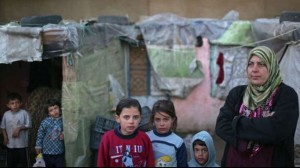 GENEVA (AP) -- As diplomats assessed prospects of bringing Syria's warring sides around the negotiating table, the United Nations said Tuesday that 40 percent of all Syrians are now in need in need of humanitarian aid.
GENEVA (AP) -- As diplomats assessed prospects of bringing Syria's warring sides around the negotiating table, the United Nations said Tuesday that 40 percent of all Syrians are now in need in need of humanitarian aid.The war in the country has left over 9 million Syrians requiring help from the U.N. and other humanitarian aid organizations, including upwardly revised figure of 6.5 million people who are now internally displaced, said Jens Laerke, a spokesman for the U.N. Office for the Coordination of Humanitarian Affairs in Geneva, said of the new figures.
"They're staggering, it's a disaster, and it continues," Jens Laerke, a spokesman for the U.N. Office for the Coordination of Humanitarian Affairs in Geneva, said of the new figures.
As he spoke, the U.N.'s top Syria envoy, Lakhdar Brahimi, headed into meetings with senior Russian and U.S. official to see if a U.N.-sponsored peace conference bringing together Syrian President Bashar Assad's government and a united opposition delegation could be convened later this month in Geneva.
Brahimi also planned to meet with officials from Britain, France, China and four of Syria's neighbors struggling to cope with the conflict, now in its third year. The U.N. says over 100,000 people have died.
Diplomats are trying to resume negotiations that created the roadmap for a Syrian political transition adopted last year in Geneva by key nations, including the five Security Council powers - the U.S., Russia, China, Britain and France. The roadmap for a political transition starts with the establishment of a transitional governing body agreed to by both sides, with full executive powers and ends with elections. But there has been no agreement on how to implement it. One of the sticking points remains Assad's role in the future.
Syria's information minister said the government delegation is not ready to negotiate handing over power or forming a transitional government.
In an interview with Syrian state TV late Monday, Omran al-Zoubi said Geneva talks are part of a political process, "and not a handover of power or forming a transitional governing body."
Members of the exiled and Western-backed opposition group insist Assad be excluded from Syria's future leadership for any talks to take place.
U.S. Secretary of State John Kerry told a news conference in Warsaw, Poland, that the Assad regime knows that the purpose of a second peace conference in Geneva would be to put the accepted roadmap in place.
"I don't know how anybody believes the opposition is going to give mutual consent to Assad to continue," Kerry said. "And the Syrian government has accepted to come to Geneva, so I am hoping the Syrian government, the Russians, the Iranians and others who support the Syrian regime will make certain the Syrian regime will live up to its obligation to come to Geneva to negotiate a peaceful resolution to the conflict in Syria."
The conflict began as a largely peaceful uprising against Assad's rule in March 2011 and gradually became an armed conflict, after some opposition supporters took up arms to fight a government crackdown on dissent.
Over the past year, the fighting took on sectarian overtones with predominantly Sunni Muslim rebels fighting Assad's regime that is dominated by Alawites, an offshoot Shiite group.
By The Associated Press
The Iran Project is not responsible for the content of quoted articles.










